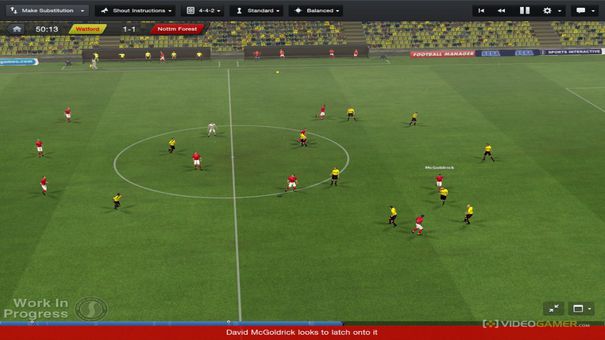

Back when I was a kid, my home town in England didn’t have any arcades, and so the only chance I got to play my favorite video games came when my family went on their yearly vacation to the seaside, where arcades are more common in England than elsewhere. I’d spend months saving up to spend my savings in a few days of frenzied game-playing, often while my mother tapped her foot waiting for me to finish playing Defender or my grandfather nagged me to get out-of-doors and into the (infrequent) sunshine.
There came home computer versions of course, but these were pale imitations of the real thing,
 especially if your computer, like mine, had only 48K of memory to replicate the kind of memory-eating monsters that cost around $2500 to buy and install at the arcade. Nothing, I thought, would ever get close to the thrill of playing those games as a teenager.
especially if your computer, like mine, had only 48K of memory to replicate the kind of memory-eating monsters that cost around $2500 to buy and install at the arcade. Nothing, I thought, would ever get close to the thrill of playing those games as a teenager.
Until a few months ago that is, when the Internet Archive unleashed hundreds of old arcade games, dating back to the earliest titles from the 1970s, to download and play for nothing. The games' presentation isn’t perfect, due to the processing power taken up in mimicking the outdated technology of games around forty years old, but the Internet Archive's section on how dealing with technical issues should set you straight. But for now, this is as close as you’ll get to being a kid in an arcade again, the pleasure centers of your little brain fizzing at the flashing lights and pulse-pounding soundtracks that made you dig deep into your (parents’) pockets for one last quarter (or ten pence piece, if you’re British), and you don’t have to ask the scary guy in the kiosk for change. Here are my favorites from the Internet Archive selection:
During the summer of the year of this game’s release, I would be ten years old, turning eleven. The only example of this game I ever saw wasn’t even in a normal arcade, but stood on its own by the entrance of a small open-ended hall between two stores, which meant playing MotoRace USA (or Zippy Racer, as this overseas editions were named) risked exposure to the elements or, even worse, ordinary shoppers. Like many later racing games, MotoRace USA involved riding from one coast of the country to another, Los Angeles to New York in this case, appealing to a kid who’d never traveled from one side of Britain to another, let alone America.
 Once you begun to play, you felt as if you were going somewhere, thanks to the ‘staged’ format of the game, where you reached LA via Las Vegas, Houston, St Louis and Chicago. Despite the linear nature of the gameplay, there were some quirks along the way, intriguing little side-roads you could take for a brief time, gaining extra points; marked stretches by the road’s edge enabling you to wheelie for a few seconds; broken bridges to jump; the fuel cans necessary for continuing the journey were often tucked away in corners or behind obstacles. The ride could be narrow and awkward, with your rider the sole motorcyclist on a road full of jostling cars (which resembled the Mini, then starting to disappear from Britain’s roads).
Once you begun to play, you felt as if you were going somewhere, thanks to the ‘staged’ format of the game, where you reached LA via Las Vegas, Houston, St Louis and Chicago. Despite the linear nature of the gameplay, there were some quirks along the way, intriguing little side-roads you could take for a brief time, gaining extra points; marked stretches by the road’s edge enabling you to wheelie for a few seconds; broken bridges to jump; the fuel cans necessary for continuing the journey were often tucked away in corners or behind obstacles. The ride could be narrow and awkward, with your rider the sole motorcyclist on a road full of jostling cars (which resembled the Mini, then starting to disappear from Britain’s roads).
Not that I minded so much; easy games aren’t much fun to play after a while, and MotoRace USA had enough to keep you interested. I can’t say I ever developed much skill at the game; with only a limited supply of money, and with so many other games to play, I gave only a little to each game, but I made it to the Las Vegas stage a few times. If I’d ever visited Vegas as a kid I might have died with excitement at the sight of so much neon and so many slot machines, but MotoRace USA gave me just enough Vegas to taste and as the motorcyclist shot up along the screen beyond the point of perspective, I wanted to join him, and listen to the game’s curious music, part engine, part circus, for real.
No sooner did you reach the destination though, you were back at the race, and I could never go fast enough, or far enough. MotoRace USA confirmed what I thought I knew about America, its speed, its highways and diversions, the progression towards something brighter and better than where you were now, and of the fun and excitement along the way. Years later, I learned if you did reach New York, the screen displayed an animated Statue of Liberty, waving at you. Waving in greeting, I thought, or in goodbye?
As an English kid, even the most mundane examples of Americana seemed exciting and
 glamorous; the yellow school buses, the glitzy breakfast cereals, even the Twinkies advertised in superhero comics, and likewise the life of the American paperboy. Freewheeling down broad, smooth highways, slinging copies of the Daily Bugle over the sun-baked sidewalk and into driveways seemed almost alien to children used to delivering newspapers as if they were mail, first thing in the morning under slate-grey skies. And so the Paperboy arcade machine appeared almost as alien as the 2001: A Space Odyssey obelisk when I first saw it in an arcade, it looked, and somehow felt, so different from other games around it.
glamorous; the yellow school buses, the glitzy breakfast cereals, even the Twinkies advertised in superhero comics, and likewise the life of the American paperboy. Freewheeling down broad, smooth highways, slinging copies of the Daily Bugle over the sun-baked sidewalk and into driveways seemed almost alien to children used to delivering newspapers as if they were mail, first thing in the morning under slate-grey skies. And so the Paperboy arcade machine appeared almost as alien as the 2001: A Space Odyssey obelisk when I first saw it in an arcade, it looked, and somehow felt, so different from other games around it.
The controls were different, resembling the handlebars of a bicycle, instead of the usual couple of buttons (next to game instructions usually scratched off by the arcade owner); the screen seemed larger, the colors crisper yet with a cartoon-like quality. The game cost more to play (twenty pence instead of ten, the first machine I saw to charge so much) but the recompense came in an unusually long game experience, and in world all its own, yet Paperboy's was also a recognizable world.
I won’t bore you by going over the game’s plot – if nothing else, ignorance of your goals while playing an arcade game for the first time will match the average player’s own experience. But part of Paperboy’s charm came in that the aim, to deliver newspapers to customers’ homes, was almost beside the point. The variety of other characters, and how they affected on your game, felt more like a TV cartoon; in fact, there’s a hint of The Simpsons and their Evergreen Terrace about Paperboy’s world of Easy Street, Middle Road and Hard Way, the three choices presented to the gamer at the start of play.
Instead of evil monsters or power-crazed aliens, the paperboy’s adversaries are ordinary people, animals or objects taken up a comedy notch or two, who don’t want to kill our hero, but just get in his way instead. The stakes are laughably low compared to most of the other arcade game up to that point; the future of humanity isn’t at stake, just the part-time job of kid trying to make it from one end of the street to the other, to one end of the week to the other. If he failed, then Paperboy only suffered the sack, either metaphorically from his boss, or literally, with his satchel over his head in a heap on the road, after colliding with a drunk or a skateboarder.
Paperboy also provided chances for both mischief and heroism, an irresistible mix; which kid wouldn’t want to be rewarded for the chance to smash windows while passing the house of a non-subscriber, or for knocking over the gravestones of the creepy house on the corner, while also protecting homes from burglary with a well-aimed newspaper?
All this makes Paperboy as involving and fun to play now as it was in 1985. Not only do you get to feel like a kid again, but you are a kid again, in kid’s cartoon version of the world.
Of course, there comes a time when we leave the paper round behind, get ourselves a full-time job, and perhaps, if we earn enough cash, buy ourselves a new Ferrari Testarossa and cruise across the country. OK, so a job isn’t perhaps the most glamorous thing to a child, but money and fast cars certainly are, and to me, America made anything seem doubly exciting. When I first played OutRun (probably a couple of years after its first release, as it often took a while for the latest arcade games to reach the UK), it felt like I’d drowned in SunKist and gone to Dennis the Menace’s idea of what Heaven looked like to an adult.
 As much as I liked car chases in Hollywood movies, and arcade games like Chase HQ, the world of OutRun presented a friendlier, summery place, without criminals or cops, but just as exciting. The game’s time limit meant you couldn’t slack off from the accelerator, but the world that sped by the open-topped roof of your car looked like the kind of place where something fun always happened, where the best tunes and the best people were just over the horizon or around the next tight bend. Even before the game proper began, you got to choose which soundtrack you’d like to play on the in-car radio: 'Passing Breeze', 'Splash Wave' or 'Magical Sound Shower', all of which sounded like the music the air would play in California.
As much as I liked car chases in Hollywood movies, and arcade games like Chase HQ, the world of OutRun presented a friendlier, summery place, without criminals or cops, but just as exciting. The game’s time limit meant you couldn’t slack off from the accelerator, but the world that sped by the open-topped roof of your car looked like the kind of place where something fun always happened, where the best tunes and the best people were just over the horizon or around the next tight bend. Even before the game proper began, you got to choose which soundtrack you’d like to play on the in-car radio: 'Passing Breeze', 'Splash Wave' or 'Magical Sound Shower', all of which sounded like the music the air would play in California.
And then you were at the starting line, not of a racetrack with a faceless crowd in the distance, but in the middle of a freeway, waved off by a cheering crowd who have gathered around you and your passenger (a blonde woman), oblivious to the normal traffic flowing freely on the other side of the road. Such convivial spontaneity felt to me quintessentially American.
OutRun handled like a dream; for the first time in a game, your car hugged the road, and the game’s use of perspective made you feel more in the car itself, and not looking down from on high. You leaned into corners, and felt the shock of a crash (a spectacular rollover, depositing you and your confused-looking girlfriend onto the road), especially if you played in one of the innovative ‘sit-down’ editions of the machine, which rocked and tilted according to how you controlled your car.
The amount of detail packed into the game’s background, and the changing scenarios found in each successive level of the game, made OutRun feel alive, and you imagined the in-game characters felt good to be alive, racing through America’s landscapes with time the only inhibition to their freedom. This, I imagined, is what adulthood should look like, even if I knew it would not; to jump into a beautifully designed car, with your best girl by your side, and just drive towards the sunshine.
Of course, time runs out, sooner than you hoped, and you were back in the arcade with no more money in your pocket, with the constrictions of family and school, and a future whose only certainty was more of the same, but different. The song OutRun played at the end of each game, ‘Last Wave’ is the sound of a warm sun setting into a cooler night, a poignant farewell to something that might only have been part of your imagination all along, an America viewed from thousands of miles away, filtered by TV, movies and comic-books. Life, you thought, would be too much of a game as fun.



